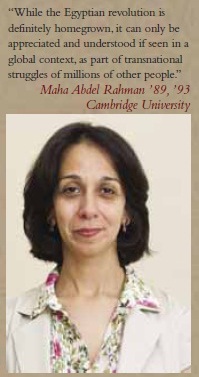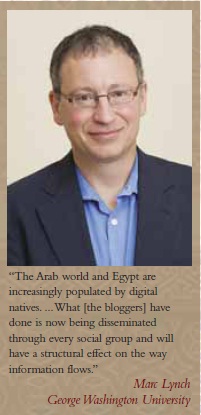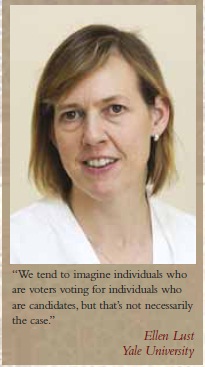Through the Political Prism:Dissecting Egypt's Roadmap
AUC conference brings together international activists and scholars to discuss the country's future
 |
From its beginnings as one fruit seller's stand against police brutality to the ousting of dictators across the Middle East, the Arab Spring has turned predictions on the future of the Middle East on their heads. In conversations held on street corners, as well as in coffeehouses, offices, homes and universities across the world, the events –– widely lauded as the first wave of "Facebook revolutions" –– have forced both participants and observers to reconsider the existing literature and long-held assumptions about the region.
Nearly five months after the uprising
began in Egypt, international
academics and Egyptian activists
gathered in Oriental Hall at AUC
Tahrir Square in a conference titled
From Tahrir: Revolution or
Democratic Transition. The event, held
in coordination with
the Project on
Middle East Political Science, discussed
the events sweeping the Arab world
and how best to chart the course for
the new Egypt.
Burn the Books?
Opinions as to the true cause of the
January 25th revolution are nearly as
plentiful as the Ana Masry [I Am
Egyptian] tees for sale at Tahrir Square.
Most agree that some combination of
inevitability mixed with the inspiration
of Tunisia's "Jasmine Revolution"
played a significant role in determining
the precise timing of Egypt's uprising.
Despite a wealth of literature on the
topic of democratic transition, many
academics have been frustrated by the
existing canon's overall failure to
predict events.
"Traditionally, the literature on
democracy paid very little attention to
how it came about, with the exception
of that which emphasized the
numerous prerequisites for democracy,"
said Philippe Schmitter of the
European University Institute, author
of some of the seminal works on
regime transitions from authoritarian
rule and a self-declared transitologist.
"From my past experience looking on
Latin America and Southern Europe,
the failure to account for such
transitions made me realize that the
existing literature in political science
was largely irrelevant. Therefore, I
decided to ignore this statistically
possibilistic approach and, instead, to
think in possibilistic terms.
Just suppose there are no material or cultural prerequisites for democracy and, hence, that it is possible anywhere. What strategies and combinations among actors, especially among elite actors, could result in a regime where rulers and representatives would be held accountable in a systematic fashion to their citizens?"
Others have taken a less radical stance. Steven Heydemann of the U.S. Institute for Peace, while agreeing that, at times, the literature is not as helpful as needed, cautioned political scientists from disregarding it entirely. "I think we can agree that the literature is something of the theoretical equivalent of the Mugamma [government office complex in Tahrir Square], a huge sprawling edifice that we spend too much time in at one point or another," he joked. "Still, it maintains a usefulness in that it allows us to identify ways in which Egypt's experience diverges from the kinds of sequences that the transition literature tends to associate with successful transitions to democracy."
 |
Maha Abdel Rahman '89, '93 of
Cambridge University chose to place
Egypt's uprising in a global context.
"While the Egyptian revolution is
definitely homegrown, it can only be
appreciated and understood if seen in a
global context, as part of transnational
struggles of millions of other people," she said. "In a sense, revolutions are the
manifestation of failures and
contradictions unique to a society or a
nation in which they take place, but
have impact f ar beyond its borders."
Click Yes to Attend
A Facebook revolution? Not so, said
Hossam el-Hamalawy, the celebrated
blogger whose 3arabawy blog is one of
the most popular in the Egyptian
blogosphere. "Cyber activism began not
in 2011, but in 2000, with the star t of
the second Palestinian intifada, through
mass mailing lists that circulated
information about protests and spread
word about any detentions," he said, arguing that the relatively few
Egyptians engaged online still pale in
comparison to the mobilization seen
during the revolution. "Mubarak did
not fall because we changed our
Twitter avatars or updated our
Facebook statuses," he said. "Really,
most of the 12 million who were in
the streets were not in the cyber
community, nor are the labor strikers."
The result of online activism is still
pronounced and will have implications
even in foreign policy, noted Marc
Lynch of George Washington
University. "This is going to change
how Egypt chooses to deal with its
neighbors because they are now
accountable to their people," he said. "The Arab world and Egypt are
increasingly populated by digital
natives. Hossam and the bloggers were
the first, but what they have done is
now being disseminated through every
social g roup and will have a structural
effect on the way information flows."
 |
Elections and Expectations
Ellen Lust, associate professor and scholar of elections at Yale University, believes that a shift in people's attitudes toward elections is as equally important as rewriting the electoral system. "We tend to imagine individuals who are voters voting for individuals who are candidates, but that's not necessarily the case," she said. "Individuals going into elections and embedded in broader social structures with mutual relationships see themselves as being distinct from other s in other g roups. ... It's tempting to think that we've changed all that, and there's no reason to believe that people will go to the polls for the same things that they used to, but if you look at the literature that comes out of sub-Saharan Afr ica and Latin America, you see that clientalism is still alive. While the political system may be changing, there are lots of reasons that people's perception of themselves in society or how society fits together has not changed. It's not helpful to expect that problems will disappear just because there's a new system in town."
Reimagining Security
Sit down with Hossam Bahgat of the
Egyptian Initiative for Personal
Rights, and he will tell you a story
about the "slippery slope," his term for
what he sees as Egypt's gadual
dissolution of human and civil rights.
"In the late 1980s and early 1990s,
there was a serious threat of Islamist
violence, and a green light was g iven
to the security service," said Bahgat. "What we allowed to the counterterror
ism forces later expanded out to
the State Security Investigations
Service, then to the entire interior
ministry until we reached the point of
endemic cor r uption, abuses and
violence." The revolution, he
explained, has given Egyptians an
opportunity not seen in years to
reclaim their rights. "We need to revise the entire legal framework of
the structure of the interior ministry
as well as the specific rules for some
departments," he said, emphasizing
the importance of parliament as an
oversight structure and civil society
as a monitoring mechanism. "We
should move the prisons department
to the Ministry of Justice. Civil
affairs, birth certificates and driving
licenses should not be given by
uniformed officers. Instead, we really
need to slim down the department
to just issues of law and order."
 |
Bruce Rutherford, author of the
presciently titled book Egypt After
Mubarak: Liberalism, Islam and
Democracy in the Arab World (Princeton
University Press, 2008), explained that
the way to conceptualize security
sector reform is to view it as the
re-establishing of boundaries between
state and society. "If we start with the
observation that the security services
are an instrument of state power, the
boundary between state power and
society largely disappeared under the old regime," he said.
Rutherford also noted that the
parallel court system, created under
Nasser and employed to try civilians
in exceptional courts and military
courts, circumvented the legal system
and was responsible for denying many
Egyptians their rights, but had also left
the ordinary judiciary largely
untouched. "It is this judiciary that has
been instrumental in many of the
reforms and actions taken against the
former regime thus far, from
dismantling the NDP [National
Democratic Party] to detaining
Mubarak and his family," Rutherford
said. "To allow the judiciary to reclaim
its intended role permanently will
require reforms of that sector as well.
Judges have been calling for a number
of reforms, including a larger budget,
the capacity to carry out their own
investigations rather than relying on
investigations conducted by the public
prosecutor and the capacity to ensure
that court rulings are implemented
quickly and fully."
Consolidating Peace
 |
Now that Mubarak is gone, it's time
for the real work to begin, particularly
given the recently contentious
relationship between the role of
religion and government in Egypt.
"Democracy is less likely to be
consolidated if there are deep,
unresolved divisions in the polity
about fundamental constitutional
issues such as the relationship between
state, religion and society," explained
Alfred Stepan of Columbia University,
adding, "Of all the major freedom and
democracy-ranking statistical bureaus,
not one has labeled any Arab state a
democracy in the last 35 years. Many
Americans see that no Arab country is
a democracy and all Arab countries
are Muslim, and conclude then that
no Muslim countries are democratic.
This is untrue, but clearly, the way
religion is adopted into the state will
make a huge difference in how democracy is consolidated."
In addition to religion, many are
worried about how choices made to
support the country's economy will
affect the pace of political reforms.
However, according to David Stark,
also of Columbia University, the
choice between economic and
political reforms is a false one.
"Strength in the sense of being very
powerful and unchecked did not
bring about economic reform," he
said. "Rather, the post-socialist
surprise was that the main obstacles to
democracy and economic
development were not posed by those
who gained the least from economic
reform, but rather by the early
winners." Democracy, Stark noted,
must have both vertical and
horizontal accountability. "Such
extended accountability must go
beyond those who hold office to
organized groups and actors in civil
society," he said.
By Madeline Welsh
Photos by Ahmad El-Nemr